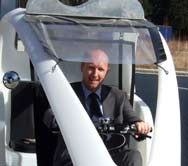The fuel cell used to be part of the future – a next gen technology that was perpetually just around the corner.
Now it has arrived for real. It means reliable off-grid power at times and places when the wind and sun are unavailable. And that in turn means off-grid comfort.
The first product into the consumer market is SFC’s methanol based energy pack, containing in just 8 kilos the same power as 270kg of lead acid batteries or an 80 kilo tank of hydrogen. Methanol was “chosen because it is a liquid fuel with a tremendously high energy density” said Peter Podesser, of SFC. Podesser has an off-grid “hut” in Southern Austria where he tests the company”s products. He is about to take delivery of their biggest power pack yet ” being developed for military use.
For mere civilians the packs come in four sizes costing between E2000-4000 ($3200-6400). The company says the two larger products will support reasonably household use for a fortnight in combination with a small solar panel and a 12 volt battery.
The retail price will decline over the next few years through a combination of innovation and economies of scale. At the moment the cost is on the high side compared to a E350 ($560) for a powerful solar panel, but if you can afford it, the payback is simplicity, small size and higher reliability. The only by-products are water vapour and traces of CO2 which come out of the “exhaust” but still fulfill Californian zero emissions standards.
The power packs are protected by more than a dozen patents, and SFC, floated on the Frankfurt stock exchange last year and has a market capitalisation at time of writing of E60m ($96m)
Methanol, also called wood alcohol, is normally a by-product of natural gas production but Methanol is produced in ever growing quantity out of organic waste in Germany.
For the technically minded, 8KG of methanol+SFC’s fuel cell =10 Kilowatt hours of electricity.
Currently SFC”s main focus is boats and yachts “Half of what we do is in the leisure area” said Podesser. RV brand “Hymer were one of our first partners — it was a milestone when they decided to adopt our systems as the standard component of their S class ” their luxury line- and then their B class,”
“People like to spend their spare time where they find it nice, Podesser said. ” in the mountains, at the seaside ” whatever ” the enjoyment stops when you have to shut down the heating or go without the fridge ” you don”t want the evening to end in the dark with warm beer.” SFC calls the need for reliable off-grid power “comfortonomy”.
Refills for the SFC system cost E16 for 5 litres and E24 for 10 litres. They are just containers of methanol “sold in a safety cartridge which ensures that the user cannot get access to the methanol. It is made of ruggedised plastic that has passed all the safety tests to qualify as a vehicle accessory,” said Podesser. In the case of Hymer RVs, that is exactly what the SFC fuel cell is.
SFC have clearance to transport their products in the cargo hold of planes and so far have a total of 800 points of sale across Europe ” where people can buy the refills. Mail order is hard because the weight of the refills mean the profit would be handed to the postal system/
As well as cabins, vans and boats, the fuel cells are finding industrial applications in remote installations such as temporary traffic lights, remote weather sensors, or remote controlled surveillance cameras
The company has grown quickly from its garage roots, but it has much further to go. ” We still have to become the first fuel cell company that does not spend more than it earns” says Podesser. Then maybe he will be able to move out of his hovel in the Austrian mountains and afford a nice chalet.
powkey Portable Power Station 350W, 260Wh/70,000mAh Backup Lithium Battery, 110V Pure Sine Wave Power Bank with 2 AC Outlets, Portable Generator for Outdoors Camping Travel Hunting Emergency
Now retrieving the rating.
$192.98 (as of April 18, 2024 14:24 GMT +01:00 - More infoProduct prices and availability are accurate as of the date/time indicated and are subject to change. Any price and availability information displayed on [relevant Amazon Site(s), as applicable] at the time of purchase will apply to the purchase of this product.)200W Portable Power Station, Powkey 120Wh/33,000mAh Power Bank with AC Outlet, 110V 6 Outputs Solar Generator External Battery Pack with LED Light for Home Use and Outdoor Camping
Now retrieving the rating.
31% OffPortable Power Station 600W, Powkey 296Wh Battery Backup with 2 Pure Sine Wave AC Outlets, USB-C PD100W and 2 Wireless Chargers, Solar Generator (Solar Panel Optional) for Outdoor Camping/RVs/Home Use
Now retrieving the rating.
10% OffFoldable Solar Panel Charger 60W with 18V DC Output (11 Connectors) for 100W~350W Portable Power Stations Jackery/Rockpals/Flashfish/Enginstar, Portable Solar Generator for Outdoor Camping Van RV Trip
Now retrieving the rating.
$98.99 (as of April 18, 2024 14:24 GMT +01:00 - More infoProduct prices and availability are accurate as of the date/time indicated and are subject to change. Any price and availability information displayed on [relevant Amazon Site(s), as applicable] at the time of purchase will apply to the purchase of this product.)10W USB LED Light for Camping Garage Warehouse Car Truck Fishing Boat Outdoor Portable Bulb, Emergency Light, Children Bed Lamp
Now retrieving the rating.
$9.99 (as of April 18, 2024 14:24 GMT +01:00 - More infoProduct prices and availability are accurate as of the date/time indicated and are subject to change. Any price and availability information displayed on [relevant Amazon Site(s), as applicable] at the time of purchase will apply to the purchase of this product.)






